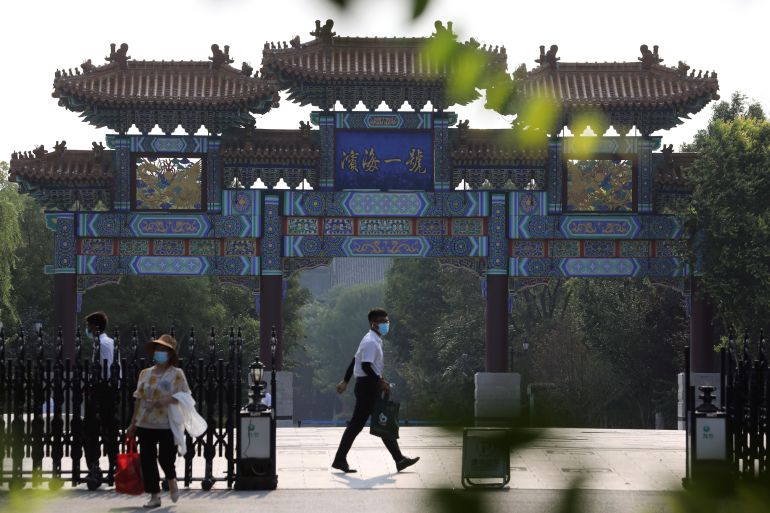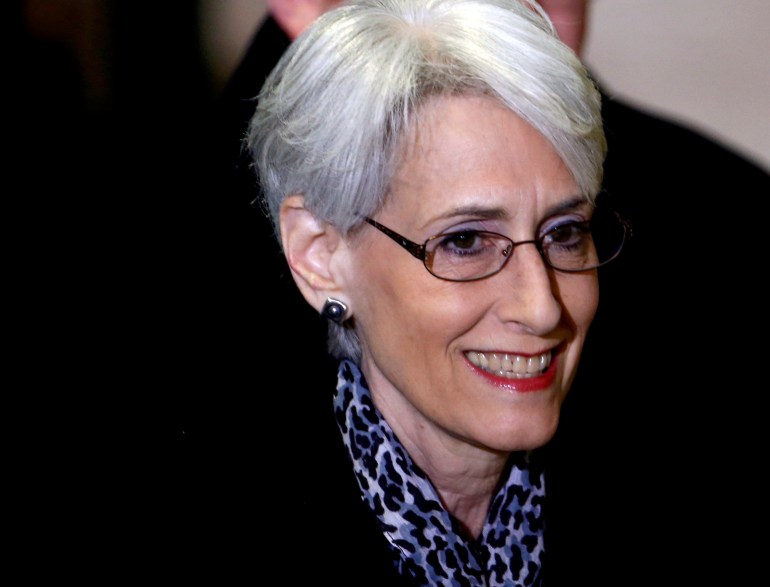China blames US for fraught relations as talks begin
US Deputy Secretary of State Wendy Sherman is in China’s Tianjin to discuss the fraught ties between the two superpowers.

China has blamed the United States for what it called a “stalemate” in bilateral relations as high-level face-to-face talks began in the Chinese city of Tianjin.
In a meeting with US’s No 2 diplomat on Monday, China’s Vice Foreign Minister Xie Feng urged Washington “to change its highly misguided mindset and dangerous policy,” according to the official Xinhua News Agency.
Keep reading
list of 4 itemsUS-China talks come at time of heightened tension
Shanghai cancels flights as Typhoon In-Fa lashes eastern China
China shuts down ports, cancels flights as Typhoon In-Fa nears
“US-China relations are in a standstill and face serious difficulties,” Xinhua quoted Xie as telling US Deputy Secretary of State Wendy Sherman.
“The United States wants to reignite the sense of national purpose by establishing China as an ‘imaginary enemy’.”
Sherman, in an interview with the Associated Press news agency, called on China to look beyond differences and work with the United States on difficult global issues such as climate and the COVID-19 pandemic as a responsible global power.
The US has not backed down from criticizing China on issues from human rights to its territorial ambitions since President Joe Biden took office in January. China has repeatedly said that the US cannot expect cooperation while also suppressing China’s rise, a charge that Sherman denied.
“There are some things that rise above specific differences that are the global responsibility of great powers,” Sherman said in a phone interview shortly after she wrapped up successive meetings Xie and Foreign Minister Wang Yi.
Sherman’s China visit was added late to an Asian itinerary that included stops in Japan, South Korea and Mongolia amid wrangling over protocol between Beijing and Washington.
She is the highest-ranking US official to visit China since Biden took office six months ago.

Relations between the countries deteriorated sharply under his predecessor, former President Donald Trump and the two sides remain at odds over a host of issues including human rights, Hong Kong, Xinjiang, technology and a number of other issues.
“The good news is the two sides are sitting down to talk. But the fractious relationship cannot be denied. Ties are fraught, they are in a free fall,” said Al Jazeera’s Adrian Brown, reporting from Hong Kong.
“What Wendy Sherman has to do is to try and see if there’s a way that the relationship can be managed better. Also, a few months from now, The G20 summit will be held in Rome and it is impossible to imagine that President Joe Biden and President Xi Jinping would not sit down in such a setting and talk. So these current talks are in a way aimed at paving the way for that meeting.”
Senior US officials have said the goal of the talks is not to negotiate specific issues but to keep high-level communications channels open. The US wants to ensure that guardrails are in place to prevent competition between the countries from becoming conflict, they said.
A day before Sherman’s arrival, Wang had said China would not accept the US taking a “superior” position in the relationship.
“China would never accept any country that claims to be superior to others,” he told China’s Phoenix Television. “If the US has not learned to treat other countries equally, China and the international community have the responsibility to help the US learn how to do this.”
Sherman, who arrived Sunday evening from Mongolia, tweeted “heartfelt condolences (from the United States) to those who have lost loved ones” in severe storms and flooding last week that killed at least 63 people in Henan province.
Her meetings follow an initial and highly contentious meeting in March in Anchorage, Alaska, where Wang and veteran Chinese diplomat Yang Jiechi flew to meet US Secretary of State Antony Blinken and National Security Advisor Jake Sullivan.
At that meeting, Chinese officials, including Wang, railed against the state of US democracy, while US officials accused the Chinese side of grandstanding.
Monday’s talks were held amid stringent Chinese COVID-19 measures, which have meant that visiting foreign officials have met Chinese counterparts outside Beijing, the capital.
Foreign media were kept at a distance from the hotel where the talks took place, but Chinese media were permitted on the premises.